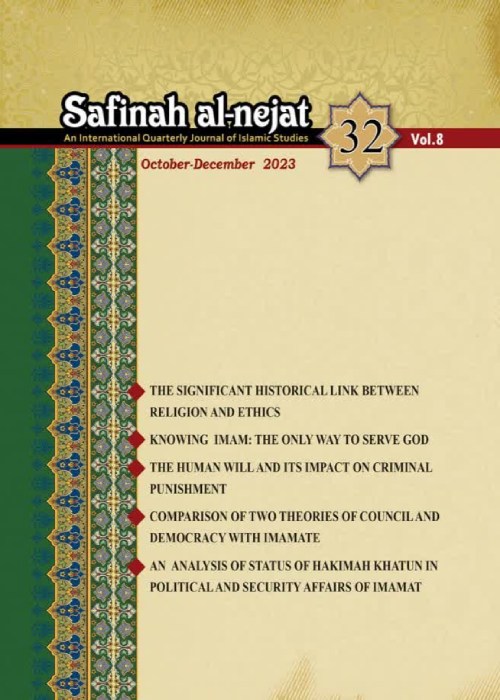فهرست مطالب

Safinah al-nejat
Volume:1 Issue: 1, Winter 2016
- تاریخ انتشار: 1395/04/01
- تعداد عناوین: 11
-
Page 5
-
Page 7In the series of these articles, we will discuss the issue of free will and fatalism in the view of Muslim schools. The rational arguments and the supportive narrations from the holy Quran and the traditions reported by different groups will be provided. In the first part, which is presented here, we provide an overview of the issue, the historical and traditional backgrounds that gave birth to various issues concerning this subject.Keywords: independent will, free will, fatalism, will of Allah, intention, planning
-
Page 23most Quran interpreters and scholars have arguments regarding the miraculous aspect of Quran. Some of them put more emphasize on rhetoric and literary aspects of it and some others on spiritual and meaning of it. The issues concerning miraculous aspect of Quran can be considered of two parts: the first one why has not the word miracle been mentioned in Quran per.se. and if it is true to apply this word for verses of Quran? The second, why, in Quran and traditions of infallibles, is there no talkof eloquence and rhetoric of Quran? But instead some descriptions like guidance, Light, reason, proof, Sultan,… have been used. The meaning-wise and content-wise miraculous aspect of Quran are more important than eloquence and rhetoric of it and some Shia scholars highly emphasized on them.Keywords: miracle, aspects of miracle, rhetoric miracle, eloquence, rhetoric, meaning, content, based miracle, verse, reason, proof, Ḥujjat, guidance, taḥaddi (challenge others)
-
Business and Entrepreneurship / Explanation based on the life of Imam AliPage 31To approach a society with no poverty and unemployment, comprehensive progress of business and entrepreneurship based on Islamic instructions is required. To fulfill this target, Islamic vision upon business and entrepreneurship derived from hadiths and honorable verses must be reviewed. Regarding the fact that the true religion of Islamic and respectful verses sent by The Almighty recognizing human‟s basic needs and traits, the instructions and patterns will accelerate divine goals of creation.Keywords: Business, Entrepreneurship, Islam, Imam Ali (AS).
-
An Approach By Nahj al-Balāghahs / Knowing Allah, His Greatness and His GracePage 42Nahaj al-Balāghah is divided into three sections of Sermons, Letters and short Sayings or' Wise Sayings'(ḥikam), as they are usually called. Nahaj alBalāghah dates back to about one thousand years ago when the late Sayyid Radi compiled these Letters and Sermons at the end of the third and the outset of the fifth century (400A.H.).It is, thus, a one-thousand-year-old book. It is to be noted, however, before Sayyid Radi efforts to gather Ali's Sermons and Sayings, they were scattered in the books of the Tradition's and history. Faith in Tuhid is the first pillar of Islam. Tuhid or One-ness of Allah is the central point of the teachings of all the prophets. Each prophet put his emphasis on this doctrine. The best means by which seekers of nearness to Allah, the Glorified, the Exalted, seek nearness, is the belief in Him and His Prophet. In this article, the focus is to reveal the importance of Praise in Amir al-Muminin‟s (a.s.) sayings. Also, the approach by which Imam puts forward the most fundamental pillar of Islam will be discussed and analyzed. Blessed is he who sincerely devotes the entirety of his actions, knowledge, love, hatred, receiving, relinquishing, speech, silence, deeds, and statements absolutely to Allah.Keywords: Amir al muminin (a.s.), Nahaj al Balāghah, monotheism, grace, praise
-
Page 49the author of the present article had an insight into the principal of Imamat according to the words of Imam Ali mentioned in the authentic sources specially these two books “Kamāl al-Din” and “Nahj al-Balāghah”, both belonged to the 4th century A.H., 10th B.C.; the aim of Imamat which is continuing the light of guidance will be reached by knowing and following Ahl al-Bayt. Finally by accepting Imam Mahdi (a.s.), it will result in men‟s salvation.Keywords: Imamat, Imam Ali, Imam Mahdi, Ahl al Bayt, Nahj al Balāghah, Kamal al Din
-
Du ā / A way to connect GodPage 58the researcher of the present study draw readers‟ attentions to the meanings of du‟ā offered by some scholars, like Ayatullah Mahdi Isfahani and Ayatullah Mirza Muhammad Baqir Maleki Miyaniji. Further, he touches upon the importance of du‟ā which is a way to get closer to God and to remember the innate powerlessness of human beings in front of God, from Qurānic and traditions point of view. The impact of prayer at the time of hardship and Badā which is one of the most significant issues regarding the Unity of God “Tuḥid” mentioned in Quran and traditions has been also dealt with.Keywords: du‟ā Unity of God (Tuḥid), Human beings, innate powerlessness, hardship, Badaʼ Isfahani, MirzaMahdi, Maleki Miyaneji
-
Translation of Thār and Thār Allāh / In Typical Ziarat-Texts in Favor of Imam al-Ḥusayn: Some Problems, Prospects, and SolutionsPage 67the author of the present study tries to elaborate on the meaning of thārand thārAllah according to Ziarat-texts. Following this article, a book review on “Raḥmat-I Wāsi‟ah: Bayān-I raḥmat-I Wāsi‟ah-yi Khudā. Ḥadrat-I Sayyid alShuhadā „alayh al-salām” which is a book about Imam Ḥusayn has been include.Keywords: thār, thār Allah
-
Page 78Ḥikmah, which literally means forbiddance and being stable, is an unchangeable knowledge, which guards human beings against ignorance and illogical deeds; Logic can be regarded as a powerful source of this knowledge. Besides this, God Almighty is a source of this knowledge, the knowledge which is bestowed to the prophets and infallibles. Ḥikmah includes believes, practical religious regulations (Aḥkām), and morality which lighten up logic. The Arabic translators chose the word Ḥikmah referring to Greece philosophy; therefore, the word Ḥikmah in philosophical books has been used to talk about a science which can be deduced through reasoning. This meaning has nothing to do with the Qurānic meaning of this word.Keywords: Ḥikmah
-
Page 87Muslims in the recent years have to take various approaches regarding globalization and fundamentalism. The present article tries to declare true familiarity with religion can help to face these issues logically.Keywords: religion, globalization, fundamentalism


